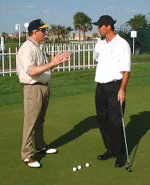
Strategies For an Effective Practice Round
What is the purpose of a practice round?
This often trips up many golfers setting themselves up for failure before the competitive round even starts.
Many golfers use practice rounds as a predictor of their scores for the tournament.
To be more specific, a good practice round is more about your strategy and game plan for the tournament, than how well you perform in the practice round.
To illustrate this point, let’s examine the case of Bob B…
Bob is a junior golfer who has competed at the USGA Junior Championships over the last few years.
Bob had good showings his first two years but, at last year’s championships, Bob never found his rhythm from the very first hole.
Bob had four double bogeys over the first 12 holes and was very disappointed and upset over his performance.
When asked to compare this year’s performance to last year’s performance, Bob was quick to attribute his poor play to his practice round.
Bob stated that last year he felt comfortable during his practice round.
In contrast, Bob said his practice round felt different this year, “I didn’t feel comfortable. My tee shots were landing all over the place and I was missing easy putts. I knew I was going to play horribly. I just didn’t have it. I was so anxious in the clubhouse that I couldn’t even focus. I played exactly how I did in the practice round, just like I thought I would.”
Bob used his poor practice round as evidence that he would not perform his best when it mattered most.
As his practice round became difficult, Bob made a faulty assumption that he was off his game.
Bob became anxious and with anxiety comes increased muscle tension.
Bob’s ability to focus was compromised.
All Bob could think about was how bad he was playing and concluded there was nothing he could do about it.
In essence, Bob talked himself into a bad round.
It is easy to see how a bad practice round can hurt a golfer’s mindset heading into a competition.
How can you move forward after a bad round?
The answer is you need to see a practice round for what it is…
A practice round has several purposes:
- Warming up – Swinging the club during a practice round helps you loosen up and get the blood flowing.
- Getting a feel for the course – A walk –through on the course can help you evaluate the course conditions and give you a sense of how to play the course.
- Getting comfortable and ready for the competitive round – Basically, this aspect of the practice round is to prepare you mentally and physically for the competitive round.
By understanding the purpose of a practice round and not projecting those results into a competitive round, you will release yourself of expectations and not be tied to what happened yesterday.
Players on the PGA Tour are faced with the same situation in regards to practice rounds. PGA players know practice rounds are necessary to feel out the course, yet still many professional golfers fall into the mental trap of placing too much emphasis of how well they played throughout the practice round.
Justin Rose, No. 3 in the world, has a unique perspective in regards to practice rounds.
Rose doesn’t put that much credence on his level of play during a practice round.
In fact, sometimes Rose doesn’t even swing a club during a practice round but uses that time to do a walk-through to get a good read on the course.
Prior to the 2018 PGA Championship, Rose revealed his strategy for the first few practice rounds.
ROSE: “I haven’t actually played a practice round in terms of going out there with my golf clubs. I have walked each nine and got some good visuals.”
Why would a golfer not even swing a club during the practice round of a major event?
Rose expounded on his strategy and his reasoning for not swinging a club during his first couple of practice rounds.
ROSE: “I walked nine holes both days. So I haven’t hit a bad shot on the golf course. So I kind of went out there today and had a very clear intent on what I wanted to do on every hole. Often you can be biased how you play in practice at times, and that can influence the clubs you want to hit off the tee and what you’re comfortable doing. Today I had a bit of a blank canvas to play with, and I felt comfortable on the course.”
Now Rose’s strategy may not be the best for everyone but the most important takeaway was that Rose did not want the results of his practice round to influence his mindset when for the tournament.
Let’s further delve into Rose’s walk-through strategy…
First, Rose didn’t want to start his tournament play on a negative note with any bad shots during his practices.
Second, Rose already felt he was adequately prepared physically. Rose felt he could best utilize his time by mentally preparing for the tough competition and identifying a game plan for each hole.
Don’t muddle the purpose of your practice round.
Your practice round is not a predictor of your competitive performance…
Your practice round is to get a game plan that suits your strengths.
Tip for Having an Effective Practice Round:
Create a goal for your practice.
- What do you want out of your practice round?
- Is the goal of your practice round to warm up?
- Is your goal for the practice round to evaluate the course conditions?
- Is the goal of your practice round to create a game plan for each hole?
- Is your goal to become mentally prepared for the battle of competition?
Your practice round is more about preparation than performance. Don’t start doubting your game if you don’t do well in the practice round.
Instead, focus on how you will navigate the course given your strengths.
Related Golf Psychology Articles
- Practice Rounds vs. Tournament Rounds
- How Mickelson Uses Smart Practice Principles
- How to Bring Your Practice Swing to the Course
- Subscribe to The Golf Psychology Podcast on iTunes
- Subscribe to The Golf Psychology Podcast on Spotify
Golf Mental Coaching Programs

All golf psychology programs include the Golfer’s Mental Aptitude Assessment (GMAP), a custom Mental Game Plan, weekly coaching sessions, unlimited email correspondence, and The Golfer’s Mental Edge 2.0 workbook program.
One-on-one mental coaching is the fastest and most effective method to improve your mental game, boost your performance, and make lasting changes!
We have unique mental coaching programs, customized for you. Please contact us with any questions your have about our programs. Provide your name, email, and role below:
Or Call us today at 888-742-7225 | Mental Game Success Stories